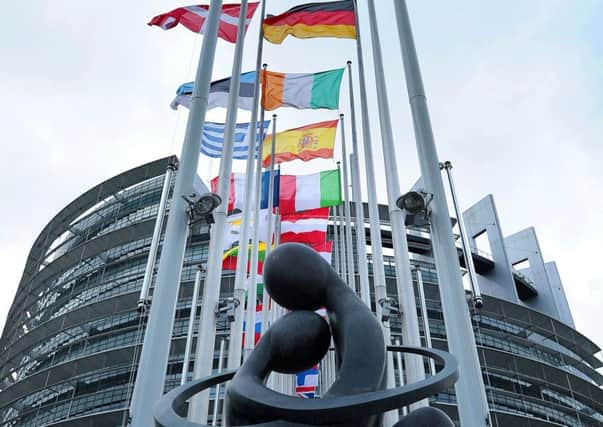Alastair Stewart: The European Union’s biggest failure has been explaining what it does


Last week’s EU elections are excellent proof that democracy is what you make of it. There are more sides of the election claiming a victory than there were candidates on the ballot sheet. We’ve morphed into the country of the “implied” vote rather than the direct mandate – a success for the SNP must, therefore, mean support for Scottish independence and remaining in Europe; the decimation of the Scottish Conservatives and Labour is both a show of Remain support and Brexit gall depending on how you collate the vote.
We’re in post-modern politics now. Manifestos were once about a general statement of principles for governance. We’re now in the age of the tweet, one-line, 10-word statements of purpose by which your support for a party or candidate infers your support for everything that they might do, full-stop.
Advertisement
Hide AdAdvertisement
Hide AdIt’s a dangerous precedent, one I’m convinced is eroding the idea of representative democracy in Britain (rather than the direct, ask-the-public-about-every-question election). It feels like we’re one step away from an electoral app for mobile phones, and I don’t know how I feel about that.
What I will say is that, for the most informed generation, there’s an absolute lack of clear facts about the European Union.
And there’s a difference between “stifling” and “sifting” in an election. Political parties of all ilks are stifling honest debate because they’re leaving voters to sift through the facts about a 40-year old engagement that has touched on every facet of British cultural, economic and social life. There’s something for everyone to hate and love, but sometimes it seems impossible to give an accurate reading on a straightforward question: “Do you understand what the European Union does?”
I’m quite serious with this, and expect equal disdain for the following confession: there are times when the EU just confuses me. How it interacts with national governments, how it functions, who this or that directorate is and how it makes and implements policy and who the ultimate decision-maker is.
Democracy relies on the electorate making as informed a choice as possible. If knowledge is power, then I seriously worry that all political parties have missed a beat with Europe and it is making the Brexit vitriol worse. It is not enough to say “We’re Remain” or “We’re for Leave” because those statements are so broad.
Brexit is a unique exercise in futurism that rests on an acute logistical misunderstanding. Whatever one’s perception or disposition towards the EU, the biggest failure of the institution, its critics and its acolytes in kind, is to explain what it does.
Now you’re reading this and are one step away from saying use Wikipedia and Google. And quite right. The point is, we’re living in a political age now where information is so open to interpretation and regurgitation that the trust between the people, their elected officials and the press is at an all-time low. On top of that, the 2019 EU election campaign was about making a “statement” vote rather than feeding into actual parliamentary policy in the European Parliament.
Perhaps I’ve made an argument for leaving – the EU is so vast that it’s far exceeded its original purpose to prevent war through post-war social and economic integration. Now it just falls into the category of being benignly good or an expansionist juggernaut.
Advertisement
Hide AdAdvertisement
Hide AdIn the middle, somewhere, is the need for reliable, digestible nuggets of facts that inform the public on their morning commute. Brexit will never die as an issue in Britain because there can be no such list. It’s all emotion now. Imagine the fresh hell of a 40-year-old married couple going through the checklist of who p***ed off who for the last half-century. Everyone would have an opinion and everyone, would, at some stage, be right.
The elephant in this particular room is the implication I’m calling voters too stupid to make up their minds – quite the opposite. The unique drawback with the EU, as with, say, British foreign policy, is it has an indirect impact on people, but they are rarely, knowingly impacted by it.
There are a select few who might call for the abolishment of the Foreign Office but most, by the same logic, would accept it as an essential function of the state.
So two equally prevailing attitudes have emerged from the diluted, simplistic Brexit ruckus. The first admits that just because you don’t understand something doesn’t mean it’s not essential. Thus, the status quo should prevail. The second says that overwhelming institutional or political complexity is probably detrimental, even if you’re not entirely sure how. Walk away.
The “safe bet” versus the “retreat” reaction is a gut instinct brought out in people who don’t have all the facts. The Greek philosopher Xenophanes might have been on to something when he said: “No man knows distinctly anything, and no man ever will.” Brexit is guesswork on an unparalleled scale. The rhetoric from all parties has not been matched by an information drive to explain the organs and operations of the EU. Instead we’ve all but had a second, mini EU referendum with fewer details and more speculation as to “what the result really means”.
It would be fascinating to observe how the polls would change if party literature shifted from benefits and downsides to “How to understand the EU, according to...”
Not to end on a cliché, but I worry it might be too late.
l Alastair Stewart is a freelance writer and journalist. Read more from him at www.agjstewart.com or follow him on Twitter @agjstewart